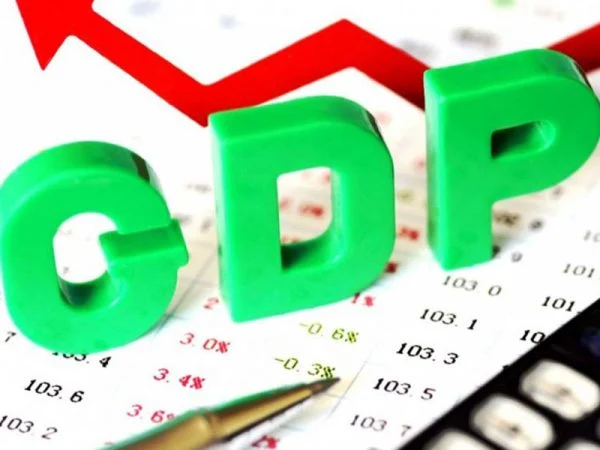Nigeria’s Gross Domestic Product (GDP) grew by 2.51 per cent (year-on-year) in real terms in the second quarter of 2023, up from 2.31 per cent recorded in the first quarter of 2023.
Although the growth rate is lower than the 3.54 per cent recorded in the second quarter of 2022, the National Bureau of Statistics (NBS) has revealed in a report on Friday.
Join our WhatsApp ChannelNigeria’s Gross Domestic Product (GDP) grew by 2.51 per cent (year-on-year) in real terms in the second quarter of 2023, up from 2.31 per cent recorded in the first quarter of 2023.
Although the growth rate is lower than the 3.54 per cent recorded in the second quarter of 2022, the National Bureau of Statistics (NBS) has revealed in a report on Friday.
“Nigeria’s Gross Domestic Product (GDP) grew by 2.51% (year-on-year) in real terms in the second quarter of 2023. This growth rate is lower than the 3.54% recorded in the second quarter of 2022 and may be attributed to the challenging economic conditions being experienced,” the report reads.
It added that: “In the quarter under review, aggregate GDP stood at N52,103,927.13 million in nominal terms. This performance is higher when compared to the second quarter of 2022 which recorded aggregate GDP of N45,004,520.89 million, indicating a year-on-year nominal growth of 15.77%.”
The services industry contributed 58.42 per cent to the real industry, agriculture added 23.01 per cent and the industries sector recorded 18.56 per cent during the review quarter.
Highlighting the growth of the sectors which are categorised under non-oil sector, the NBS said: “The performance of the GDP in the second quarter of 2023 was driven mainly by the Services sector, which recorded a growth of 4.42% and contributed 58.42% to the aggregate GDP.
“The agriculture sector grew by 1.50%, an improvement from the growth of 1.20% recorded in the second quarter of 2022. The growth of the industry sector was -1.94% relative to -2.30% recorded in the second quarter of 2022. In terms of share to the GDP, agriculture, and the industry sectors contributed less to the aggregate GDP in the second quarter of 2023 compared to the second quarter of 2022.”
Non-oil sector performance
The non-oil sector accounted for 94.66 per cent of the GDP in Q2 2023, up from 93.71 per cent contributed in Q1 2023, contrasting with the 93.67 per cent recorded in the second quarter last year.
“The non-oil sector grew by 3.58% in real terms during the reference quarter (Q2 2023). This rate was lower by 1.19% points compared to the rate recorded in the same quarter of 2022 and 0.81% points higher than the first quarter of 2023.
“This sector was driven in the second quarter of 2023 mainly by Information and Communication (Telecommunication); Financial and Insurance (Financial Institutions); Trade; Agriculture (Crop production); Manufacturing (Food, Beverage & Tobacco); Construction; and Real Estate, accounting for positive GDP growth.
“In real terms, the non-oil sector contributed 94.66% to the nation’s GDP in the second quarter of 2023, higher than the share recorded in the second quarter of 2022 which was 93.67% and higher than the first quarter of 2023 recorded as 93.79%.”
Oil sector performance
However, the oil sector’s contribution contracted to 5.34 per cent between April to June this year, against 6.21 per cent reported in Q1 2023. It also fell short of the 6.33 per cent posted in Q2 2022.
“The real growth of the oil sector was –13.43% (year-on-year) in Q2 2023, indicating a decrease of 1.66% points relative to the rate recorded in the corresponding quarter of 2022 (-11.77%).
“Growth also decreased by 9.22% points when compared to Q1 2023 which was –4.21%. On a quarter-on-quarter basis, the oil sector recorded a growth rate of -14.12% in Q2 2023. The Oil sector contributed 5.34% to the total real GDP in Q2 2023, down from the figure recorded in the corresponding period of 2022 and down from the preceding quarter, where it contributed 6.33% and 6.21% respectively.”
The depreciation in the contribution of the oil sector is on the back of the decline in the average daily oil production in the review period, as output fell to 1.22 million barrels per day (mbpd), falling to surpass the 1.43mbpd recorded in the same quarter of 2022.
“The nation in the second quarter of 2023 recorded an average daily oil production of 1.22 million barrels per day (mbpd), lower than the daily average production of 1.43mbpd recorded in the same quarter of 2022 by 0.22mbpd and lower than the first quarter of 2023 production volume of 1.51 mbpd by 0.29mbpd,” the NBS explained in the report.

















Follow Us